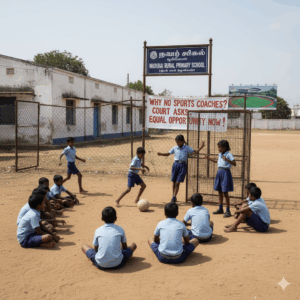Local News
Madurai School Kids Miss Out on Sports: Court Questions Why Physical Education Teachers Are Only in Big Schools
In a quiet courtroom at the Madurai Bench of the Madras High Court, judges raised a simple but important question: Why are Physical Education Teachers (PETs) only allowed in schools with more than 250 students?

It might seem like a small issue, but for many children in Madurai and nearby villages, this rule has a big impact. In small schools, children go to class, study their lessons, and take exams—but when it comes to sports and physical activity, there is often no one to guide them.
Empty Playgrounds
In many schools with fewer than 250 students, the playgrounds are empty during breaks. The kids run around on their own, play some informal games, or sometimes just sit under a tree. Without a PET, there is no one to teach them how to play sports properly, no one to encourage them, and no one to guide them about fitness and health.
“My son loves to play football,” said Kalaiselvi, a mother from a village near Usilampatti. “But his school does not have a physical education teacher. He plays by himself and misses learning how to improve.”
Why the Court is Concerned
The High Court judges noticed that restricting PETs to bigger schools is unfair. They said fitness and sports are important for all children, no matter how many students a school has. The judges also mentioned that children who do not get proper physical activity may face health problems like obesity, diabetes, or even stress and depression.
“Are we saying fitness is only for some children?” one judge asked. “Every child has the right to learn sports and stay healthy.”
Teachers Struggle Too
In smaller schools, sometimes regular teachers try to supervise games. But they are not trained to teach sports. Sundaram, a headmaster from Melur, said, “We have a big field, but without a trained teacher, the children cannot learn properly. They just play on their own, and many lose interest.”
Physical education is more than just games. Experts say children who exercise regularly concentrate better in class, feel confident, and develop teamwork skills. Without proper guidance, all these benefits are lost.
Old Rules, New Problems
The government rule to give PETs only to schools with 250 or more students was made long ago to save money. But now it seems unfair. Smaller schools, especially in villages, are missing out. And these are the very schools where children may need the most support to stay healthy and active.
A Possible Solution
The High Court has asked the education department to review this rule. Some experts suggest sharing PETs among a few smaller schools or appointing part-time teachers so that every child gets a chance to learn sports.
Parents and teachers are hopeful. They believe that if the rule changes, children will have proper guidance in sports, enjoy physical activity, and grow up healthier.
Little Praveen, a student from a small school, said, “We have a playground, but no teacher to teach us sports. If we had one, I could learn athletics and run faster.”
That simple wish shows why this issue is important. Physical education is not a luxury—it is a right for all children. Thanks to the attention of the Madurai Bench, it may soon become a right that every child can enjoy.





